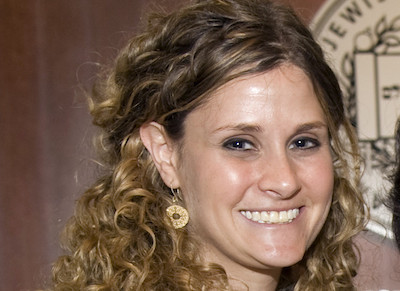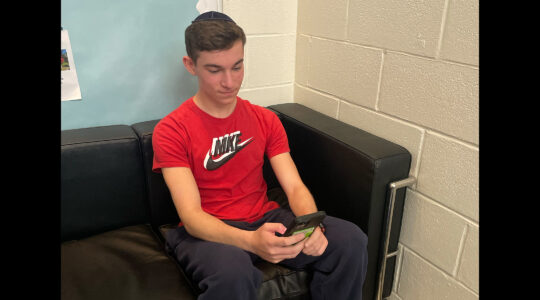
Naomi Firestone-Teeter: New exec has been with Jewish Book Council since 2006. (Courtesy of the Jewish Book Council)
On April 1, Naomi Firestone-Teeter became executive director of the Jewish Book Council, which promotes the reading, writing, publishing and distribution of English-language Jewish books. Firestone-Teeter, whose predecessor Carolyn Hessel has been called “the Jewish Oprah” for her success at promoting books, has been working her way up in the organization since graduating from Emory University in 2006, serving most recently as its associate director. JTA recently caught up by email with the 31-year-old exec. The interview has been condensed and edited.
What interested you in this kind of work?
I studied literature in college, a passion of mine from as early as I can remember, so the importance of both having literature in my own life as I moved forward, and helping to cultivate that interest in others has been one of my key drivers. In academic environments, reading and literature are a natural part of the culture, but beyond these institutions it often requires effort to both keep up with one’s reading and also create situations in which one can engage with others about what they’re reading. On the Jewish side, I grew up in a family that took Judaism very seriously and was surrounded (literally, wall to wall in some rooms) by both Jewish and secular texts.
I know that you have done a great deal with using the Web and social media to create a presence for Jewish books. How does the Internet affect reading habits?
I think the Internet is a very exciting place for the literary community and has created many new paths for discovery for readers and many new opportunities for authors to find their readers. Essentially, in a way, it mirrors what has always existed — mega-sites serving a similar function as big-box stores that sell books and smaller, literary sites serving a role that’s similar to independent bookstores (with both usually working in tandem with their physical counterpart). But it has expanded opportunities across the board. People have more access to authors and more opportunities to engage with others about their ideas — even if they’re not geographically in the same area — including publishers.
What literary sites do you recommend?
For all things Jewish and literary, obviously everyone should be using Jewish Book Council‘s online resources, but for more general literary resources, some of my favorite sites include Electric Literature, PEN American Center, Largehearted Boy, One Story, MobyLives! and Words Without Borders, among others!
Who are your favorite Jewish authors?
My list is constantly changing, and I work with so many incredible authors, that this is truly an impossible question to answer! I can say, though, that in the current crop of writers, I’m very excited about the most recent batch of Sami Rohr Prize winners and finalists: Ayelet Tsabari, Kenneth Bonert, Molly Antopol, Boris Fishman and Yelena Akhtiorskaya. And of course, I’m over the moon about the nine authors who are participating in JBC’s literary series Unpacking the Book: Jewish Writers in Conversation. You can find all of their names here.
Do you have time to keep up with all the required reading, and do you have time to read any non-Jewish authors?
It’s definitely difficult to keep up, as I’m also in two book clubs, both of which started about a year after college and are still going strong. I do the best I can though and always have a towering stack of books at my bedside, much to my husband’s chagrin! I don’t have time to read books by non-Jewish authors, but I make time! I think it’s important for me both personally and professionally to be in tune with what’s happening in the literary scene in general as well as filling in classics, Jewish and non-Jewish, along the way.
What Jewish literary trends have you been noticing lately?
One of the most obvious trends has been the influence of immigrant. Both as Americans and as Jews, we are a nation of immigrants and this is represented in our literature. We’re also seeing more about more great works by Jewish authors from around the world that have been translated into English, and new publishers that are devoted to bringing these works to the United States. And in conjunction with these trends, we’re seeing more books that reflect the experience of Jews in English-speaking places like South Africa, England and Australia. All of these works create a greater understanding of the breadth and variety within the Jewish experience as well as the links and traditions that connect Jews across the world.
JTA has documented Jewish history in real-time for over a century. Keep our journalism strong by joining us in supporting independent, award-winning reporting.






